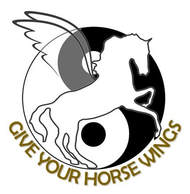EQUINE LASER-ACUPUNTURE (the no needle way)
SUSANNE DEBERNARDI - S.N.H.S. DIP AND TALLGRASS EQUINE PRACTITIONER - A.I.M.L.A certified in Equine and Canine Lasertherapy
Laser Acupuncture is an ancient Asian method that works on the same principle as acupuncture without the use of needles. It is not a diagnosis or treatment for illness, but it promotes health. Use acupressure on a horse as a preventative treatment that involves the whole body to achieve and maintain balance.
Laser Acupuncture is is form of acupuncture but the wavelength of the laser is used instead of needles to stimulate. Humans have benefited from theses practices for thousands of years and equine acupressure is gaining recognition. Performance horses may suffer from stress caused by hauling and competing. Ill-fitting saddles, poor conformation (body structure), unbalanced riders or improperly trimmed or shod hooves can cause muscle fatigue and soreness. Performing laser acupuncture on horses helps alleviate these problems as well as eliminate toxins, boost the immune system, increase blood circulation, improve flexibility and enhance metabolism. Use acupressure on a horse to release endorphins and natural cortisone. These substances increase energy, relieve pain, reduce inflammation and increase blood flow to an injured area to promote healing.
Opening and closing the meridians, working on the acupressure points and stretching are all part of a successful acupressure treatment in equines.
What types of issues can Laser Acupuncture or Acupressure address?
Disclaimer: All therapies mentioned herein is a non-invasive modality intended to enhance well-being in the healthy horse – it is not designed to replace proper veterinary care. If in doubt regarding the physical health of your horse, please consult your veterinarian.
SUSANNE DEBERNARDI - S.N.H.S. DIP AND TALLGRASS EQUINE PRACTITIONER - A.I.M.L.A certified in Equine and Canine Lasertherapy
Laser Acupuncture is an ancient Asian method that works on the same principle as acupuncture without the use of needles. It is not a diagnosis or treatment for illness, but it promotes health. Use acupressure on a horse as a preventative treatment that involves the whole body to achieve and maintain balance.
Laser Acupuncture is is form of acupuncture but the wavelength of the laser is used instead of needles to stimulate. Humans have benefited from theses practices for thousands of years and equine acupressure is gaining recognition. Performance horses may suffer from stress caused by hauling and competing. Ill-fitting saddles, poor conformation (body structure), unbalanced riders or improperly trimmed or shod hooves can cause muscle fatigue and soreness. Performing laser acupuncture on horses helps alleviate these problems as well as eliminate toxins, boost the immune system, increase blood circulation, improve flexibility and enhance metabolism. Use acupressure on a horse to release endorphins and natural cortisone. These substances increase energy, relieve pain, reduce inflammation and increase blood flow to an injured area to promote healing.
Opening and closing the meridians, working on the acupressure points and stretching are all part of a successful acupressure treatment in equines.
What types of issues can Laser Acupuncture or Acupressure address?
- Reducing fear, anxiety, and stress
- Aging and past injuries
- Improving body flexibility and mobility
- Relieving muscle spasms and stiffness
- Strengthening muscles, tendons, joints, and bones
- Building the immune system to resolve or prevent illness
- Balancing energy to optimize the body’s natural ability to heal
- Releasing of natural cortisone to reduce swelling and inflammation
- Releasing endorphins necessary to increase energy or relieve pain
- Enhancing mental clarity and calm required for focus in training and performance
- Resolving injuries more readily by increasing blood supply and moving toxins
Disclaimer: All therapies mentioned herein is a non-invasive modality intended to enhance well-being in the healthy horse – it is not designed to replace proper veterinary care. If in doubt regarding the physical health of your horse, please consult your veterinarian.

